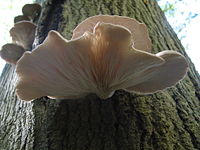
Photo from wikipedia
Primarily, this study aims to evaluate the biosurfactant production capability of Stenotrophomonas sp. S1VKR-26, profiling of its bioremediation ability to remediate petroleum refinery wastewater in a lab-scale bioreactor and assessment… Click to show full abstract
Primarily, this study aims to evaluate the biosurfactant production capability of Stenotrophomonas sp. S1VKR-26, profiling of its bioremediation ability to remediate petroleum refinery wastewater in a lab-scale bioreactor and assessment of phytotoxicity of bioremediated petroleum wastewater. As a result, strain S1VKR-26 was found to produce 5.15 g L-1 biosurfactant, CMC of 30 mg L-1 and reduced the surface tension from 60.3 to 30.5 mN m-1. Different PAHs like naphthalene (93%), phenanthrene (86%), fluoranthene (92%), and pyrene (98.3%), total petroleum hydrocarbons (72.33%) and phenolic compounds (93.06%) were significantly remediated from the wastewater after the treatment of strain S1VKR-26. Moreover, S1VKR-26 strain treated 1:1 diluted petroleum wastewater have higher germination (100%), vigor (486), and seedling (4.86 cm) compared to untreated wastewater. Therefore, the treatment of petroleum refinery wastewater with strain S1VKR-26 could be more effective in the sense of environmental safety and irrigation for crop production in agriculture.
Journal Title: Bioresource technology
Year Published: 2020
Link to full text (if available)
Share on Social Media: Sign Up to like & get
recommendations!